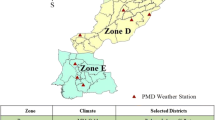Abstract
This paper has examined the impact of change in climate variables on the productivity of wheat and rice, with the help of agricultural dataset, spanning 1971–2005, for agricultural yield at the district level. The expected impact of productivity of wheat and rice due to climate variables has been turned to declined wheat production and increased rice production in some regions, while the magnitude of impacts is varied. Any change in climate variables directly affected inputs such as water for irrigation, amounts of solar radiation that affect plant growth, as well as the prevalence of pests. The study finds that impact of climate change is not identical; it varied in all the geographical regions because agricultural activities in India mainly depend on climate variables: monsoon, rainfalls, temperature, growing degree days, etc. Any changes in these variables projected to have adverse effects on agricultural productivity, water resources, coastal ecosystems, and biodiversity.
Access this chapter
Tax calculation will be finalised at checkout
Purchases are for personal use only
Similar content being viewed by others
References
Aggarwal PK (2009) Vulnerability of Indian agriculture to climate change: current state of knowledge. Presented at the National Workshop, New Delhi
Attri S, Rathore L (2003) Simulation of impact of projected climate change on wheat in India. Int J Climatol 23:693–705, 5.5.2
Buchinsky M (1995) Estimating the asymptotic covariance matrix for quantile regression models a Monte Carlo study. J Econ 68(2):303–338, 3.4
Deschenes BO, Greenstone M (2007) The economic impacts of climate change: evidence from agricultural output and random fluctuations in weather. Am Econ Rev 97(1):354–385, 1, 5.4
Fitzenberger B (1998) The moving blocks bootstrap and robust inference for linear least squares and quantile regressions. J Econ 82(2):235–287, 3.4
Fitzenberger B, Koenker R, Machado JAF (2002) Economic applications of quantile regression. Physica Verlag, New York, 3.2, 10, 3.4, 5
Foley A et al (2011) Solutions for a cultivated planet. Nature 478:337–342
Guiteras R (2008) The impact of climate change on Indian agriculture’, Unpublished manuscript, 1, 2.1, 2.2, 4.2.1, 5.1, 5.4
Harding M, Lamarche C (2009) A quantile regression approach for estimating panel data models using instrumental variables. Econ Lett 104(3):133–135. 3.2, 5.6 India. Glob Environ Chang 18(4): 655–665
Kapetanios G (2008) A bootstrap procedure for panel data sets with many cross-sectional units. Econ J 11(2):377–395, 3.4, B
Koenker R (2004) Quantile regression for longitudinal data. J Multivar Anal 91(1):74–89, 3.2, and 3.4
Koenker R (2005) Quantile regression. Working paper, Cambridge University Press, 2, 3.5
Koenker R (2010) Additive Models for Quantile Regression: An Analysis of Risk Factors for Malnutrition in India. Advances in Social Science Research Using R, pages 23–33, .3.5
Koto K, Galvao A Jr, Montes-Rojas G (2010) Asymptotics and bootstrap inference for panel quantile regression models with fixed effects, Working paper no. TR-10. Hiroshima University, Hiroshima
Krishnamurti TN, Kishtawal CM, Zhang Z, Larow T, Bachiochi D, Williford CE, Gadgil S, Surendran S (2000) Multimodel ensemble forecasts for weather and seasonal climate. J Climate 13:4196–4216
Krishnamurthy KCB (2010) The distributional impacts of climate change on Indian agriculture: a quantile regression approach ‘Job Market Paper. www.sipa.columbia.edu/~cb2322/job_market/JMP.pdf. Accessed 21 Nov 2011
Krishnamurthy CKB (2012) The distributional impacts of climate change on Indian agriculture: a quantile regression approach, Working paper, 69/2012. MSE, India
Kumar KS (2010) Climate change studies in Indian agriculture. EPW, 45 (26–27)
Kumar KS, Parikh J (2001) Indian agriculture and climate sensitivity. Glob Environ Chang 11(2):147–154
Mall RK, Aggarwal PK (2002) Climate change and rice yields in diverse agro-environments of India I. Evaluation of impact assessment models. Clim Chang 52(3):315–330, 5.5.2
Mall RK, Singh R et al (2006a) Impact of climate change on Indian agriculture. Clim Chang 78:445–748, a. 5.4, 5.5.2
Mall RK, Singh R et al (2006b) Impact of climate change on Indian agriculture: a review. Clim Chang 78(2):445–478, b. 5.4, 5.5.2
Mendelsohn R, Nordhaus WD, Shaw D (1994) The impact of global warming on agriculture: a Ricardian analysis. Am Econ Rev 84(4):753–771, 1
Powell D (2010) Unconditional quantile regression panel data with exogenous and endogenous repressors. Working paper no WR 701–1. RAND Population Research Center
Rosen A (2009) Set identification via quantile regression in short panel, Working paper, no. CWP, 26/09. Cemmap, London
Rosenzweig MR, Binswanger HP (1993) Wealth, weather risk and the composition and profitability of agricultural investments. Econ J 103(416):56–78
Sanghi A, Medelshohn R, Dinar A (1998) Measuring the impact of climate change on Indian agriculture, Technical report-402. World Bank, Washington, DC
Schlenker W, Roberts MJ (2006) Nonlinear effects of weather on corn yields. Appl Econ Perspect Policy 28(3):391, 1, 4.2.1
Schlenker W, Hanemann W, Fisher A (2009) The impact on global warming on US agriculture: an econometric analysis of optimal growing conditions. Rev Econ Stat 88(1):113–125
Stern N (2007) The economics of climate change: the stern review. Cambridge University Press, Cambridge, pp 265–280
Welch J, Vincent J, Auffhammer M, Moya P, Dobermann A, Dawe D (2010) Rice yield in topical/sub-topical Asia exhibit large but opposing sensitivities to minimum and maximum temperature. Proc Natl Acad Sci U S A 107(33):145–162
Author information
Authors and Affiliations
Corresponding author
Editor information
Editors and Affiliations
Rights and permissions
Copyright information
© 2015 Springer India
About this chapter
Cite this chapter
Prajapati, H.R. (2015). Climate Change and Indian Agriculture: Impacts, Solutions, and Adaptation. In: Singh, A., Dagar, J., Arunachalam, A., R, G., Shelat, K. (eds) Climate Change Modelling, Planning and Policy for Agriculture. Springer, New Delhi. https://doi.org/10.1007/978-81-322-2157-9_16
Download citation
DOI: https://doi.org/10.1007/978-81-322-2157-9_16
Published:
Publisher Name: Springer, New Delhi
Print ISBN: 978-81-322-2156-2
Online ISBN: 978-81-322-2157-9
eBook Packages: Earth and Environmental ScienceEarth and Environmental Science (R0)




